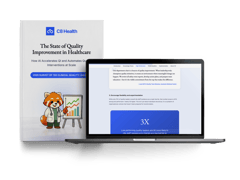
ABIM Scores: Everything You Need to Know
The American Board of Internal Medicine (ABIM) exam is a critical step for those seeking to specialize in internal medicine or one of its subspecialties. Passing it shows a physician's expertise and dedication to the field.
The American College of Cardiology (ACC) recently expressed concern about a drop in passing rates for the cardiology exam. In 2021 and 2022, the percentage of success for first-time test takers was 86%, a 7-8% decline from the usual 93% (± 2%).
Below, we'll offer a comprehensive overview of ABIM scores, including how they are reported, what they mean, and how to best prepare for the test.
Meet the Expert
Bev Holland is a registered nurse trained in the US. She has experience in labor, delivery, and pediatric and neonatal intensive care-all within acute treatment hospitals. Bev has two master's degrees in business administration and nursing.

Access Clinical Resources: Unite your department's knowledge on any device.
Manage Your Knowledge: Easily create, maintain, and update clinical resources.
Integrate Your Workflows: Deliver content directly to the point-of-care.
Collaborate and Communicate: Share knowledge and communicate across medical institutions.
Analyze Your Data: Track clinician engagement with custom insights.
How Does ABIM Calculate Scores?
The American Board of Internal Medicine (ABIM) publishes a blueprint outlining the general weighting of content areas on the exam. While the specific percentage of questions and scoring system are confidential, this resource is a valuable study guide.
In 2015, the ABIM revised the exam content to ensure it remained relevant to current medical practice. The new format incorporates a mix of multiple-choice questions and case studies.
The test grades examinees on a scale of 200 to 800, with a passing score of 366. Success rates typically range between 80% and 91%, but it is unknown whether a significant portion of test-takers score very high or very low.
How To Access Your ABIM Score
The exam is administered yearly, typically over several dates in August. The registration period for the exam is usually December-April, preceding the August test dates.
ABIM sends the test results through the internal medicine portal, where you can see your overall score and identify weak areas. But you won't see a breakdown of individual answers and explanations for incorrect responses. Results typically take about three months to be released.
Once you have passed, you will receive a certificate. This will remain valid as long as you meet the Maintenance of Certification (MOC) program requirements.
Tips to Prepare for the ABIM Exams
1. Look for Suitable Residency Programs
While residency programs aim to prepare you for the American Board of Internal Medicine (ABIM) exams, the structure of a residency program significantly impacts a student's success.
Supportive residency programs offer a curriculum that goes beyond rote memorization. They provide residents with access to diverse learning materials, such as online resources, self-assessment tools, and up-to-date clinical practice guidelines.
Programs with strong faculty and a well-defined curriculum can give residents a deeper understanding of core medical knowledge. This translates to more vital foundational skills that are crucial for success in the ABIM exams.
» Are you an MD graduate? Learn more about ACGME accreditation
2. Identify Your Knowledge Gaps
In-training exams assess the progress of residents throughout their medical training. You can track the scores you get from them over time to see your strengths and weaknesses. This self-assessment lets you tailor your studying to maximize your strengths before testing for ABIM.
Online question banks and self-assessment exams, like those offered by the ABIM or the American College of Physicians (ACP), provide comprehensive questions covering the entire ABIM exam. This makes sure you identify areas for improvement, not just your suspected weak points.
Research shows that Morbidity and Mortality (M&M) conferences can be valuable for training. They offer real-world learning on complications and unexpected outcomes directly applicable to the ABIM. M&Ms expose residents to frequently tested topics and hone critical thinking skills valued by the boards.
» Read more about closing gaps in healthcare
3. Practice Test-Taking Strategies
Create a detailed plan to ensure enough time for each section while allowing some buffer for tougher ones. Simulate the actual exam by setting a timer when you practice. This gets you used to working under pressure and ensures you can answer everything within the time limit.
The ABIM format scores only answered questions. As there's no penalty for a wrong answer, you should answer each one. If you need more clarification, use what you know to eliminate the blatantly wrong choices. This narrows your options and increases your chances of picking the right one.
4. Seek Support
Don't hesitate to leverage your professional network. Faculty and fellows who recently passed the ABIM can offer valuable insights on effective test-taking strategies. You can approach them with specific questions about areas you struggled with on the first exam.
For instance, you could ask them to recommend review materials or suggest practice cases focused on those topics. Their insights can benefit areas where you are yet to have extensive exposure during residency.
Be bold and ask a lot of questions. Investigate further if a treatment plan doesn't feel right. When encountering a challenging case, consult with attendings or fellows for guidance. They can provide valuable insights and different perspectives and identify potential issues you might have missed.
5. Manage Your Stress
Retaking the ABIM can be a stressful experience. To prevent burnout, prioritize your well-being throughout the process. Develop a study plan that allows for breaks and incorporates activities you enjoy.
Consider seeking support from a therapist or counselor specializing in anxiety management. Remember, the goal is not just to pass the exam but to emerge a more confident and well-rounded physician.
Ways ABIM Improves the Assessment Experience
ABIM is committed to continuously improving the assessment experience. Here are some ways they are currently achieving this:
-
More Realistic Testing Environment
- "Open Book" Assessments: ABIM is exploring the feasibility of allowing physicians to access online resources during exams, reflecting how they practice today.
- Realistic Lab Reports: It provides lab reports with normal ranges and flags for abnormal results, mimicking real-world lab reports.
- Sound and Video Clips: The test incorporates multimedia elements like heart sounds, diagnostic images, and videos of patient encounters to create a more realistic testing experience.
-
Enhanced Feedback and Scoring
- Improved Performance Feedback: New score reports provide detailed explanations of results and pinpoint areas for improvement to reduce medical errors.
- Multiple-Response Item Types: These questions allow for selecting multiple correct answers, reflecting the complexity of medical decision-making.
-
Advanced Test Design
- Widescreen Monitor Design: ABIM uses widescreen monitors to improve user experience during assessments.
- Simulations: The organization is researching computer-based simulations to assess skills that are not easily measured by traditional questions.
-
Usability Improvements
- Clinical Calculator: This tool grants access to formulas commonly used in practice.
- Improved Calipers and Media Player: Based on physician feedback, ABIM has improved the functionality of calipers and introduced a new media player.
Creating a Thriving Learning Environment
The ABIM exams may seem daunting, but with the proper preparation, you can conquer them. While residency training is a mandatory requirement for becoming a board-certified internist, it's more than a prerequisite. It's a powerful tool designed to help you excel on the exams and beyond.
Residents learn best in a supportive environment. A healthcare team that stays up-to-date on best practices and collaborates effectively is not just efficient; it creates a valuable learning ground. This results in better patient care, less staff burnout, and a more positive experience for everyone.
A supportive residency extends beyond mentorship. By centralizing and organizing clinical resources, C8 Health ensures everyone can access the latest best practices and treatment protocols efficiently. This streamlined information flow fosters collaboration and saves time spent looking for data.

